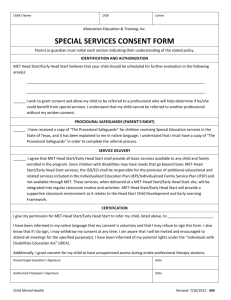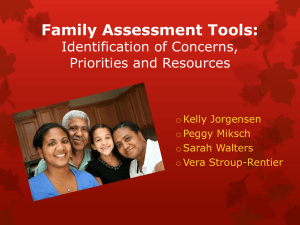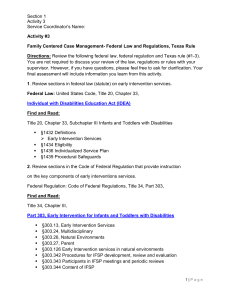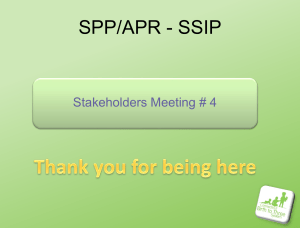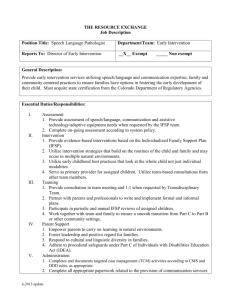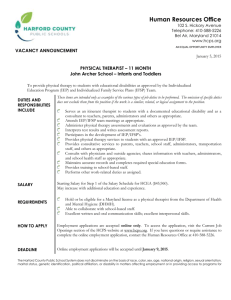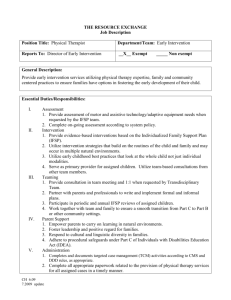Procedural Safeguards - Connecticut Birth to Three System
advertisement
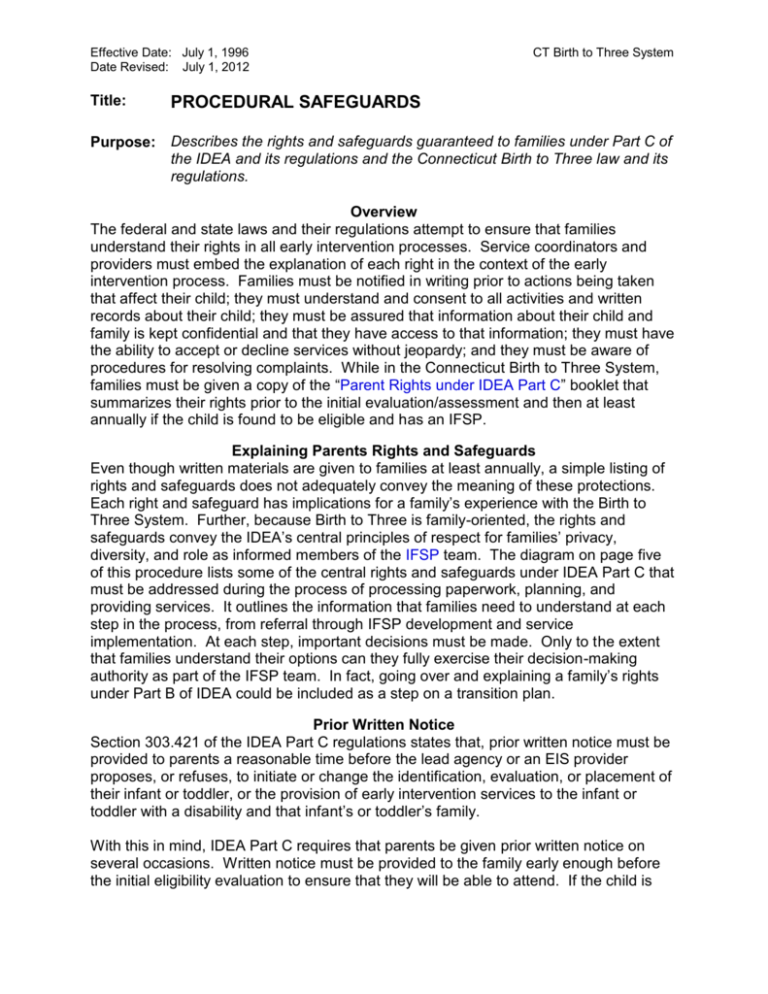
Effective Date: July 1, 1996 Date Revised: July 1, 2012 Title: CT Birth to Three System PROCEDURAL SAFEGUARDS Purpose: Describes the rights and safeguards guaranteed to families under Part C of the IDEA and its regulations and the Connecticut Birth to Three law and its regulations. Overview The federal and state laws and their regulations attempt to ensure that families understand their rights in all early intervention processes. Service coordinators and providers must embed the explanation of each right in the context of the early intervention process. Families must be notified in writing prior to actions being taken that affect their child; they must understand and consent to all activities and written records about their child; they must be assured that information about their child and family is kept confidential and that they have access to that information; they must have the ability to accept or decline services without jeopardy; and they must be aware of procedures for resolving complaints. While in the Connecticut Birth to Three System, families must be given a copy of the “Parent Rights under IDEA Part C” booklet that summarizes their rights prior to the initial evaluation/assessment and then at least annually if the child is found to be eligible and has an IFSP. Explaining Parents Rights and Safeguards Even though written materials are given to families at least annually, a simple listing of rights and safeguards does not adequately convey the meaning of these protections. Each right and safeguard has implications for a family’s experience with the Birth to Three System. Further, because Birth to Three is family-oriented, the rights and safeguards convey the IDEA’s central principles of respect for families’ privacy, diversity, and role as informed members of the IFSP team. The diagram on page five of this procedure lists some of the central rights and safeguards under IDEA Part C that must be addressed during the process of processing paperwork, planning, and providing services. It outlines the information that families need to understand at each step in the process, from referral through IFSP development and service implementation. At each step, important decisions must be made. Only to the extent that families understand their options can they fully exercise their decision-making authority as part of the IFSP team. In fact, going over and explaining a family’s rights under Part B of IDEA could be included as a step on a transition plan. Prior Written Notice Section 303.421 of the IDEA Part C regulations states that, prior written notice must be provided to parents a reasonable time before the lead agency or an EIS provider proposes, or refuses, to initiate or change the identification, evaluation, or placement of their infant or toddler, or the provision of early intervention services to the infant or toddler with a disability and that infant’s or toddler’s family. With this in mind, IDEA Part C requires that parents be given prior written notice on several occasions. Written notice must be provided to the family early enough before the initial eligibility evaluation to ensure that they will be able to attend. If the child is Procedural Safeguards page 2 NOT eligible for Birth to Three the family must be given Form 1-6 (§ 303.322). For families with children who are eligible prior written notice must be given to the family a reasonable amount of time before the IFSP meeting and after the IFSP meeting when the family and their team has determined which services are being proposed and that the start dates that are a reasonable amount of time before they begin. Form 1-6 is the Prior Written Notice form to be given to families for all actions except for those proposed or refused during an IFSP meeting. If a program is refusing to initiate services because they do not have the required paperwork back from the family, Form 1-6 can be used for this purpose. Programs check all the actions that apply for the date, time and location listed on the form. The reason, if not self-evident by the choice selected should be noted in the applicable section. Programs are not required to keep a copy of Form 1-6 in the child’s record but there must be documentation that indicates how and when Form 1-6 was given to the family. On the IFSP signature page is an additional statement about prior written notice when the program proposes, or refuses, to initiate or change early intervention services. Service Coordinators should explain this procedural safeguard to families as they establish start dates that are a reasonable amount of time before any service begins or ends. Proposing to exit a child from the system, for whatever reason, would be another example of such a change for which parents need prior written notice. Typically, this change would be proposed in the context of an IFSP meeting, but there are occasions when a program is unable to contact the family and must notify them of this proposed change. Form 1-6 is the Prior Written Notice form to be sent to families in this case. The notice must be in the parents’ native language or preferred mode of communication. Prior written notice is not required before an IFSP meeting if it is initiated by the parent. When this occurs, this situation should be documented in the record. If possible the form can be faxed or emailed to the family. Native Language or Preferred Mode of Communication Families must be able to understand all activities and written records about their child. If the family prefers another language or way of communicating (such as Braille or American Sign Language), the program must provide an interpreter if at all possible. For families who do not read, the written information should be provided orally. This is the only way that the family can become an informed team member and decisionmaker. Written Consent A program must obtain written consent (Consent to Conduct an Evaluation/Assessment Form 1-4) from a parent before conducting the initial evaluation or assessment. If consent is not given, the service coordinator must be sure that the parent: 1. is fully aware of the nature of the evaluation and assessment; and Procedural Safeguards page 3 2. understands that by not consenting to a developmental evaluation of the child, the child will not be able to receive the evaluation and assessment or services; and 3. family assessments are voluntary. An IFSP will be developed when a family declines a family assessment and the family will receive all services agreed to by the IFSP team. A program must obtain written consent (IFSP Form 3-1 Section 8, including initials in box A or B) from a parent before initiating services. If consent is not given, the service coordinator must be sure that the parent understands that by not consenting to the IFSP, the child will not be able to receive services. Written consent is required for evaluations or assessments subsequent to the initial evaluation/assessment. Confidentiality and Release of Information Laws at both the federal and state levels address the confidentiality, content, review, destruction, and accessibility of a child’s early intervention record. Each program must assure compliance with these laws. At their request, parents are to be notified who, by title, will have access to their child’s record. A program’s employees and subcontractors who need access to the record to perform a task related to his or her job description or to provide a service to the child or family, can access the record at any time. An Early Intervention Record Access Log (Form 3-4) is kept in the front of each early intervention record, but the aforementioned employees and subcontractors do not need to sign the access log. The log must be signed by any other person seeking access to the record such as the LEA (with parent consent), authorized representatives of the U.S. Dept. of Education, Dept. of Social Services, Department of Developmental Services, Center for Medicare Medicaid Services (CMS), accrediting organizations, or persons investigating allegations of abuse of neglect. For more formation, see the Records procedure. All persons will respect the confidentiality of students and their families in the daily operation of the Birth to Three program by: 1. obtaining parental permission before sharing personally identifiable information concerning children or families with any outside agency or person (use Form 3-3) 2. obtaining parental permission before requesting personally identifiable information concerning children or families from any outside agency or person (use Form 3-2.) including verbal communication with anyone not listed as a team member in Section VII of the IFSP. 3. obtaining parental permission before using a child as a subject of a study or paper for an education course 4. obtaining parental permission before taking a photo for a media presentation 5. refraining from using names of children and families in conversations outside the workplace 6. reflecting positive values and language in statements concerning children and families in professional context and daily interactions. Procedural Safeguards page 4 Examination of Records Parents may review their child’s record at any time by written request and they may request a copy of anything in that record. For more detailed information, see the Records procedure. Records kept by early intervention professionals such as intervention visit plans, daily data, anecdotal notes, or test scores are those persons’ personal records only until the information is shared with someone else. At that point, they become part of the child’s early intervention record and are subject to all rules of confidentiality and access. Accepting or Declining Services without Jeopardy Parents have the right to accept or decline any early intervention service and may decline a service after first accepting it without jeopardizing other early intervention services. If parents decide differently at a later date, they can give their consent then. Parents indicate using option A on their IFSP that they accept the services as written. Option B on the IFSP is used to decline some or all services and to indicate which if any services may begin. In a statement above the Parent Signature the IFSP also indicates that the family will take action if the team cannot come to a decision within one month. If the family requests mediation or a hearing, services from the previous IFSP must continue to be provided while the dispute is in the process of being resolved. If the family refuses to sign their IFSP giving consent for any service to begin, Form 1-6 should be used to give the parent’s prior written notice that explains the reason why the program cannot initiate services. Procedures for Resolving Complaints If the family and the early intervention team do not agree on eligibility or plans or services, or if the family has other complaints about their experience with the program or the Birth to Three System, there are procedures for resolving their concerns. (See Complaint and Dispute Resolution: Mediations and Hearings procedures) There are many informal ways for families to share their concerns with their team, however if informal steps do not work to satisfy their concern, there are other more formal steps that include a written complaint, mediation, and/or a hearing. Annual Notice of Rights Each service coordinator must annually notify families of their rights, using the brochure “Parent Rights under IDEA Part C.” The program is asked to document on the IFSP that parents have received a copy and it is preferable that they have a discussion about it with the family rather than just handing them the document. This English/Spanish document is available in several other languages on the Birth to Three website: www.birth23.org under “Especially for Families/ Parent Rights”. References: Form 1-4, Consent to Conduct Evaluation/Assessment Form 1-6, Prior Written Notice Form 3-2 Authorization for Programs to Obtain Information Form 3-3 Authorization for Programs to Release Information Form 3-4 Early Intervention Record Access Log 34 CFR Sections 303.400-438 Procedural Safeguards page 5 Sections 17a-248-5 through10 of the Regulations of Connecticut State Agencies Complaint Procedure Dispute Resolution: Mediations and Hearings Procedure Parent Rights under IDEA Part C booklet Procedural Safeguards page 6 A Step-by-Step Process for Explaining Rights to Parents Text in italics indicates practices that are recommended but are not required by law Referral Child Development Infoline distributes materials on Birth to Three services Explain referral information (name, address) will be shared (FERPA)* Parent Refuses Evaluations Explain rights to decline services Assure awareness of consequences of refusal Ineligible Explain procedures for resolving child complaints and mediation Refer to other community resources as appropriate including Help Me Grow IFSP: Decline All Services Explain services at no cost and right to change their mind at any time Explain procedures for resolving individual child complaints including mediation Explain how to access services if desired in the future _____________________________ *Family Educational Rights and Privacy Act (FERPA) enacted as Sec. 438 of the General Education Provisions Act (regulations at 34 CFR. Part 99) Intake Procedures – First Contacts Orient to EI services; overall procedures; rights and safeguards; parent’s role, IFSPs Explain available advocacy and parent support programs Explain written prior notice (use of native language or usual communication mode) Explain consent Explain confidentiality of records -examine records -release of information Implement surrogate parent if applicable Assign service coordinator Explore family concerns and priorities to plan evaluation Evaluation and Assessment Explain eligibility Explain evaluation procedures and instruments, timelines, and parent’s role in process. Explain nondiscriminatory procedures including native language/usual communication mode Provide written prior notice (action, reasons, available safeguards) Explain interim IFSP if applicable and gain consent Provide written consent for evaluation concerns, priorities, and resources and insurance billing Introduce procedures for resolving individual child complaint including mediation Explain voluntary identification of family concerns, priorities, and resources Explain informal process for, resolving complaints IFSP Plan IFSP meeting: written notice before and after, timelines, participants convenience, accessibility, native language Explain array of EI services and entitlements Provide written consent required for services Explain written prior notice and the right to accept or decline some services w/o jeopardizing other services Explain procedures for resolving individual child complaints including mediation IFSP Acceptance and Implementation of IFSP Explain periodic review, annual evaluation Explain parent fees, get consent for financial information prior to starting services Explain changes in provision of services, required notice, and possible consent (for newly initiated services) Explain termination of direct services, including for non-payment: prior notice, child complaint procedures; Transitions: prior notice, timelines, placement options, Help families transition out of special services, if appropriate Adapted from Hurth, Joicey & Goff, Paula: “Assuring the Family’s Role on the Early Intervention Team” NEC*TAC June 2002
